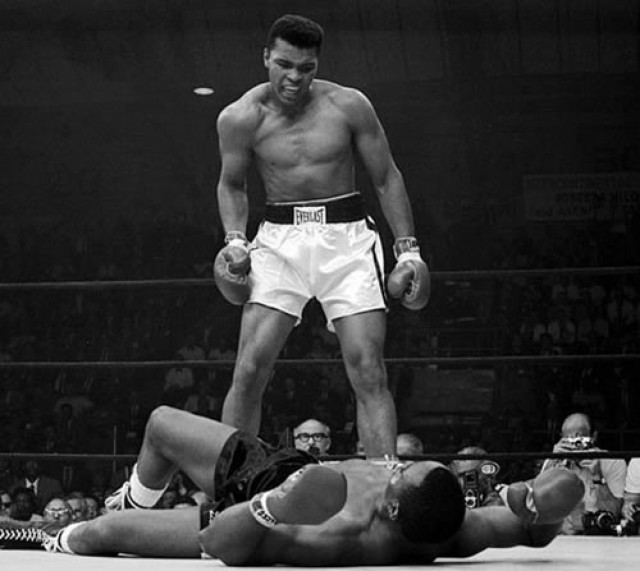
The Greatest
Muhammad Ali, the three-time heavyweight champion and self-proclaimed “Greatest of All Time,” died on Friday at the age of 74. The moment shouldn’t have been much of a shock—Ali had suffered from the ravages of Parkinson’s Disease for more than 20 years—but when I saw the news, it stopped me in my tracks. People across the world reacted in a similar fashion, and over the weekend came an outpouring of tributes and remembrances. I don’t have the personal connection with Ali that many do. I never met him, after all, and the actions both in the ring and out that made him famous nearly all happened long before I was born. But I do have one brief Ali story that I think illustrates, in a small way, Ali’s enduring legacy.
Seven or eight years ago, I lived in the Grand Lake neighborhood of Oakland. The Town’s gentrification process had begun, but this was before the tech boom truly took off, and Grand Lake was a sort of Bay Area crossroads—you could make an argument that between the diversity, Oakland’s nice weather, and the proximity to nice restaurants, the farmers market, parks, and Lake Merritt, Grand Lake was the best neighborhood in the Bay Area. At any rate, Grand Avenue had a few old dive bars that I used to like to hit up. The best one of these for watching sports was a place called Smitty’s. Smitty’s was a dark, dank dive, a place populated by old-school Oakland Raiders fans, where you drank Budweiser and well liquor and where smoking was still tacitly permitted long after it had been made illegal in California. In other words, a real dive bar.
Anyway, one random weeknight (I seem to remember it being a Thursday, but I was in grad school, and the nights kinda blend together) I was barhopping my way around Grand Avenue with a friend and we stopped into Smitty’s. The bar was pretty lively, a good crowd of old-school Oakland (i.e., black) dudes drinking cheap booze, smoking, talking shit. I guess there wasn’t any live sports going on that night, so the TV above the bar was tuned to ESPN Classic, which was showing the Rumble in the Jungle, the famous 1974 Ali–George Foreman championship fight in Zaire that was later the subject of the fantastic documentary When We Were Kings. This bout was Ali’s greatest triumph: He was attempting to become the first three-time heavyweight champion after having been stripped of his title and sent to jail for refusing to serve in Vietnam. His opponent was the towering Foreman, who had recently destroyed Joe Frazier and who seemed invincible. (People from my generation mostly associate Foreman with his eponymous grilling machine and with the goofy-uncle persona he took on in TV commercials, but in the 1970s Foreman was the scariest man on Earth. He was basically Godzilla in boxing trunks.)
During the early rounds of the match, the crowd at the bar didn’t seem too interested in the fight. After all, the early part of the fight wasn’t that interesting. Ali threw the occasional jab and hook that caused Foreman’s face to puff up, but he was mostly content to pull his arms in and allow Foreman to throw huge punches at his sides and elbows. These punches looked daunting, but they were mostly harmless, and Foreman grew tired from carrying the action. Ali later called this his “rope-a-dope” strategy. Then, late in the fifth round, Ali fired back at Foreman, landing a series of blows to the head, and all the eyes in the bar shifted upward. My fellow patrons started pointing at the screen, talking about the fight. Then Ali went back to leaning against the ropes, taking more harmless shots, and sprinkling in pinpoint accurate jabs—while talking shit to Foreman the entire time. By the end of the seventh round, Foreman was listing and stumbling as he threw his punches.
Then, the eighth round, which all students of boxing know was the last. From the bell, the whole bar was rapt. For most of the eighth, Ali kept rope-a-doping, and then, with 30 seconds left, he finally attacked.
That roar you hear from the crowd in Kinshasa? I swear that it was just as loud that night in Smitty’s. As Ali launched that vicious four-punch combo, the men around me flew out of their seats and screamed at the screen, jumping up and down and slapping hands like the fight was happening, live, in that very moment.
At the time, I thought this was a quirky, only-in-Oakland moment. But over the years I’ve changed my mind. Yes, it probably matters that it was in Oakland, the home of the Black Panthers, a city that, perhaps more than any other, can identify with a fighter who stood for Black Power. But I also think that it transcends Oakland, and shows how iconic Ali was. Could any other boxer, any other athlete, captivate a crowd like that—in any city—more than 30 years later?
Ali was not a perfect man. He was vindictive, and unforgivably cruel to his great rival, Frazier. But he was also a hero, a man who stood for his principles, who reached the greatest heights of his sport only to be cut down early and publicly by disease. He was larger than life. And yet, he was human.
On Friday night, I was at a friend’s apartment playing music. I took a break to look at my phone, and saw the news of Ali’s death. I turned to the room and said, “Holy shit. Muhammad Ali died.” We all grew quiet for a moment. And then we played this song, our own small, folky tribute to the Greatest of All Time. Ali may be leaving, but the fighter still remains.

You must be logged in to post a comment.